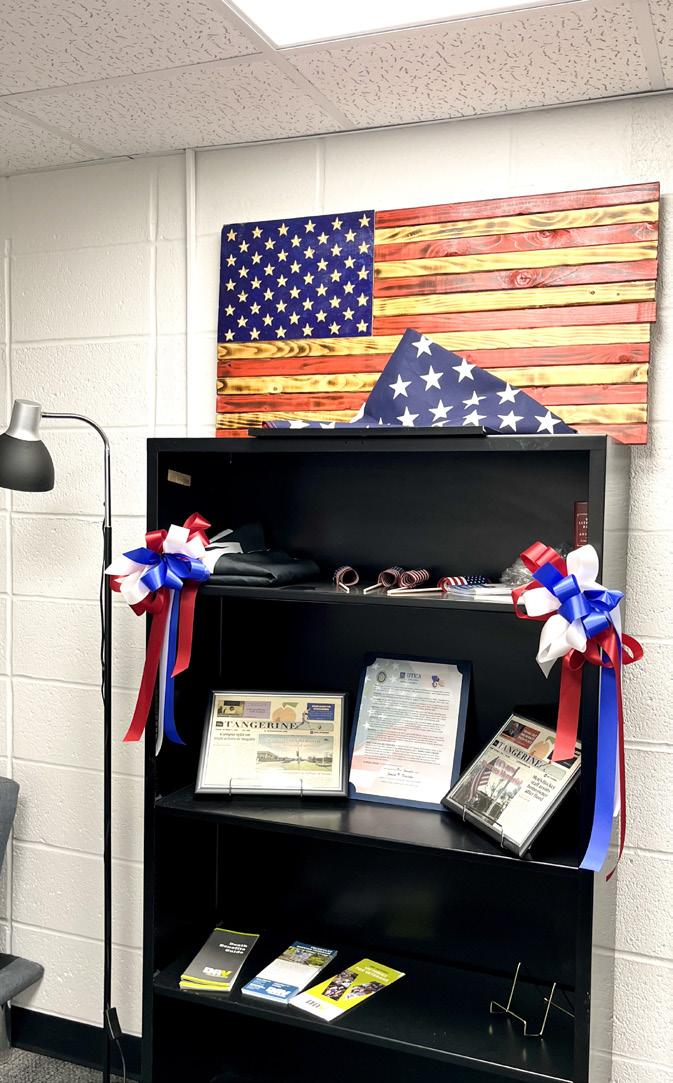New president announcement draws mixed reaction from campus
After more than five months of a confidential presidential search, Utica University announced Todd Pfannestiel as the upcoming tenth president of the university on Monday, Feb. 27.
While the reactions on campus have been mixed, some said Pfannestiel’s academic background and experience will benefit the university.
In 2018, Utica welcomed Pfannenstiel onto campus as the new provost and senior vice president for academic affairs. He has worked closely with President Laura Casamento ever since, most recently on the academic portfolio review that finished
in late February.
Arlene Lundquist, professor of psychology, said that she is happy that the final selection is a person who has experience as a faculty member, but the overall results of the search are disappointing.

“I am, however, extremely disappointed that the results of this confidential search, a process intended to broaden the scope of candidates to create a more diverse applicant pool, resulted in a selection that doesn’t appear
to reflect this goal,” Lundquist said. “I find it difficult to believe that there were no worthy women or candidates of color capable of leading this institution.”
Bernard Hyman, professor of practice - economic crime management, said he is looking forward to working with Pfannestiel and seeing how he addresses the challenges faced by the university.
“Like many other institutions of higher education, Utica University is facing a myriad of challenges now and in the foreseeable future,” Hyman said. “Overcoming those challenges will require dynamic leadership and a spirit of innovation.”




CONT. ON PAGE 4
Run, hide and fight: Active shooter and situational awareness event held on campus
DIANA SIDOREVICH CONTRIBUTING WRITER
Shad Crowe, vice president for Facilities and Emergency Management, urged staff and students to be attentive and aware of their surroundings during an informational session on situational awareness and response to a deadly shooter incident.
A group of 17, including students, staff and faculty, gathered in Hislop Hall on Feb. 21 to learn how to spot warning signs or potentially dangerous behavior and what to do when a threatening situation
arises.
“What I’m saying is, everybody in this community owns a piece of this, whether they want to or not, we all own a piece of this,” Crowe said.
Community members’ awareness of their surroundings is vital in case a threatening situation occurs. Questions to test awareness include: How many exits are in the building? What color is the car you parked next to? Do you know where the nearest exit is at the moment?
Are you noticing, or are you on your phone?
About 95% of homicides are committed by people who aren’t diagnosed with a mental health disorder, according to Crowe.
“It’s not the people you think are crazy; it’s normal people but you just don’t know,” Crowe said.
Warning signs of a potential shooter or aggressive deadly behavior include irate and antagonizing behavior, someone having a string of bad days or overreacting for minor reasons and conceptualizing and talking about guns.
If an active shooter situation arises and officials call for a lockdown, that means staying in place, said Crowe. If a lockdown is not announced, the best course of action is to ‘run, hide and fight.’ Every situation is different so he encourages people to respond to the circumstances at the moment. If facing an attack, try to obstruct the attacker’s balance and airways. Crowe says it’s best to practice being mentally prepared to not freeze during emergencies.
CONT. ON PAGE 4
VOL. LXXVI, ISSUE 4 FRIDAY, MARCH 10, 2023 UTICATANGERINE.COM The Utica University Nexus Center NEWS | PG. 5 Laurah Klepinger profile FEATURES | PG. 8 Men’s hockey UCHC championship game SPORTS| PG. 11
TANGERINE
Dr. Todd Pfannestiel shaking hands with President Laura Casamento, standing before Bob Brvenik. /Photo: Hollie David
◊ ISA HUDZIAK EDITOR-IN-CHIEF
◊
Spring 2023 STAFF
@UticaTangerine
@Utica_Tangerine
@Utica_Tangerine
Editor-In-Chief - Isa Hudziak
Managing Editor - Hollie David
News Editor - Mickale Thompson
Sports Editor - Harlee Lucier
Special Assignments Reporter - Mariami Kentchadze
Social Media Manager - Nicolas Leonard



Circulation Manager - Briana Ajayi Adviser - Mary Christopher
About
Submission Policy
Letters to the editor are welcomed from all members of the Utica University community. Letters must meet fair and accurate publishing standards and contain no libelous material. Anonymous letters to the editor will not be printed. All letters and editorials must meet the print deadline of 5 p.m. on Mondays. Please send all submissions to tanger@utica.edu. Takeback requests are a form of censorship and therefore not accepted.
Advertising Information
The Tangerine accepts paid advertisements. Advertising copy is subject to the same professional publishing standards as content. The Tangerine reserves the right to reject advertising that does not meet the standards established, is libelous, is in poor taste or violates discrimination laws. Please direct all inquiries to tanger@utica.edu. The deadline for publication is 10 a.m. on Tuesdays.
The opinions and columns expressed in The Tangerine are those of the individual writers and do not represent the views of The Tangerine or Utica University.

News Tips? Opinions? Contact The Tangerine! TANGER@UTICA.EDU

PAGE 2 FRIDAY, MARCH 10, 2023 UTICATANGERINE.COM STAFF
the academic
for Utica University
tanger@utica.edu or call 315-792-3065.
The Tangerine is published biweekly during
year by and
students. To reach a member of the staff, email
All material printed in The Tangerine is copyrighted. The Tangerine was first published as the Utica College News on Nov. 6, 1946.
AAUP-Utica explained: What the chapter does for Utica faculty
AAUP-Utica’s Collective Bargaining Agreement expired on Jan 31, 2023 and the faculty has been working without a contract since.
After the announcements of a confidential presidential search and proposed sunsetting of 15 majors at Utica, students began to see AAUP Utica stickers, One Faculty buttons and t-shirts, and signs saying “STOP THE CUTS. STRONGER TOGETHER.”
Philosophy Professor Leonore Fleming, AAUP-Utica’s President and Governing Board Officer and Negotiating Team Member, and Mathematics Professor Xiao Xiao, recently spoke to The Tangerine in a question and answer session.

What is the AAUP-Utica?
AAUP stands for American Association of University Professors. Utica’s chapter of AAUP was founded in the 1970s when Syracuse University tried to sell Utica College to the state of New York. It is a Utica faculty union that represents full-time faculty, librarians and Higher Education Opportunity Program (HEOP) counselors.
What does the AAUP-Utica do?
The unit was founded in the 1970s to

fight Syracuse University’s sale of Utica University (then, Utica College) to the state of New York and has remained as the sole bargaining agent for the college’s academic professionals, according to aauputica.org. With its contract, the unit ensures the place of academic professionals in shared governance at the university. As a chapter of the American Association of University Professors, AAUP-Utica helps fight locally and nationally for academic freedom, for the continued quality of American higher education and for protecting the livelihood of those individuals who dedicate their lives to teaching, service and research.
During the pandemic, the AAUP fought hard for safe working conditions for faculty and safe learning conditions for students. Although the AAUP has existed for a long time, their influence has recently been highlighted by the student newspaper after the announcement of a confidential presidential search and sunsetting majors.
The AAUP is concerned with the effects this would have on faculty and the lack of opportunity for students’ voices to be heard on these matters. The administration has been ignoring students, faculty, staff and alumni.
Read more online at uticatangerine.com
Campus safety Blotter

PAGE 3 FRIDAY, MARCH 10, 2023 UTICATANGERINE.COM Date Of Incident Time Of Incident Short Description Building 2/22/2023 3:45 PM Hall Damage Pioneer Village 2/22/2023 9:15 PM Fire Alarm Pioneer Village 2/25/2023 4:20 AM Alcohol Transport Tower Hall 2/25/2023 1:59 AM Facilities Issue Bell Hall 2/28/2023 2:00 PM Vandalism Alumni Hall 3/1/2023 1:15 AM Suspicious Activity Isaac Gordon Science Center 3/1/2023 6:40 AM Accident Report Faculty Center 3/5/2023 5:35 PM Fire Alarm 3/5/2023 8:30 PM Vandalism Tower Hall 3/6/2023 10:05 AM Building Access Issue Bell Hall 3/6/2023 8:20 AM Accident Report Parking Lot 3/6/2023 6:55 PM Medical Assist Pioneer Village
NEWS
◊ DIANA SIDOREVICH CONTRIBUTING WRITER
AAUP-Utica President Leonore Fleming posing outside of the Philosophy department bulletin board.
Photo: Diana Sidorevich
CONT FROM PAGE 1
According to Hyman, one such challenge the new president will face is healing the fractured relationships that emerged following the academic portfolio review decisions and subsequent protests from faculty members. The faculty stood in opposition to some administrative decisions made by the outgoing administration.
“Make no mistake, it is out of love and caring for the future of the institution and the concept of shared governance needed to keep us moving forward together. From time to time, we will struggle with inner conflict,” Hyman said. “Growth requires pain from time to time. During those times, the leadership
CONT FROM PAGE 1
Some tips that increase awareness are:
* Vary the entrance and exit doors you use entering a building to familiarize yourself with the layout
* Be attentive when someone walks in the door
* Notice the cars you walk next to and the people you sit next to
* Don’t allow unusual behavior like someone shutting the door when they enter a room
When trying to stress the importance of paying attention to surroundings, Crowe compared violent predators to sharks ready to attack.
“How do sharks eat?” Crowe asked.
They swim by repeatedly, closer and closer, checking if the prey reacts.
“That’s what these bad guys do,” Crowe said.
School shooters often perform dry runs and get to know a location and target areas within it.
“It’s incumbent upon all of us to pay attention,” Crowe said.
acumen of our new President will be tested and he will be successful so long as he continues to embrace a spirit of innovative learning here at Utica.”
For students like Colby Kusinitz, the Student Government Association president and cybersecurity major, choosing “Dr. Todd” represents an opportunity for positive growth and innovation at Utica.
“Personally, I think it speaks volumes when we call someone Doctor First Name. Additionally, his frequent presence at school athletic events and his willingness to speak at SGA meetings on short notice is a clear indication of his strong dedication to the student body,” Kusinitz said. “However,
I am curious to see how Dr. Todd balances the demands of other constituency groups when we have conflicting interests.”
Sara Kuiken, a senior health studies OT and healthcare management major, echoes Kusinitz’s sentiment and excitement.
“I am very excited for this next chapter in Utica‘s history,” Kuiken said. “Dr. Todd has expressed many times his passion for the students and shown his willingness to engage with students. This makes me hopeful that his time as president will be successful and studentfocused.”
Kathi Jabe, a biochemistry/ human rights advocacy major who plans to run for SGA president in the upcoming
election, said she hopes that the opportunity for student voices to be heard and considered will be a key part of Pfannestiel’s presidential appointment.
“In my opinion, transparency is an essential component of creating an inclusive and supportive campus community,” Jabe said. “I hope that Dr. Todd shares this belief and will prioritize fostering an environment where every student feels heard and valued. I look forward to seeing how Dr. Todd will help create a dynamic campus community that supports the diverse needs of our student body.”
violent actions.
Crowe is working in several areas to increase safety. One safety measure includes implementing a loading dock which would act as a checkpoint for delivery vehicles and personnel. He is also working on a silent barricade to provide protection for the building and points of entry in the case of an intentional or unintentional accident. Crowe also mentioned increasing safety in high-traffic areas such as the library that often have visitors.
Some attendees voiced concern about an insufficient officer presence on campus and the access that delivery services, such as Amazon, FedEx and food delivery vehicles, have to campus.

“Manpower would really be a better deterrent,” said John Keating, supervisor of Utica University’s athletic dome.
“During COVID we had a guard at the front. Only our people could get in, so I think it’s wild that we talk about how important this is, but then an $18 an-hour job we can’t handle?”
Crowe said other jobs offer more pay to potential employees and even law enforcement is struggling to
get officers.
Vice President of DEI and Student Transition Anthony Baird questioned whether creating a fortress or being disguised is better for the campus. Crowe assured attendees that the Utica campus is surrounded by a number of police departments and unarmed security officers are more approachable to students.
Since beginning his job on Utica’s campus, Crowe has implemented access control and strategic camera placement in areas of low visibility and improved lighting on campus, including parking lots and pathways. These act as deterrents to aggressive or
On March 24, Crowe and his team will roll out an app by AppArmor called USAFE that will integrate the current campus alerts app. The app will have features where students can report tips, share ‘friend walks’ that invite a friend on campus to monitor the user’s location as they walk from place to place, submit requests for facility updates, access a live Twitter feed during games, and more.

Crowe encourages students to download the app once it comes out to increase communication between students and safety personnel in a simpler manner.

UTICATANGERINE.COM NEWS
PAGE 4 FRIDAY, MARCH 10, 2023
Students walking on campus. /Photo: Diana Sidorevich
“Utica University” added to Nexus Center name



◊ ISA HUDZIAK EDITOR-IN-CHIEF
The $64 million Nexus Center building in downtown Utica will be rebranded to reflect an exclusive naming partnership that will add “Utica University” to its name and include a 10year annual $150,000 donorfunded investment.
The announcement, which took place on March 2 in the Nexus Center’s lobby, was made by Utica University, the Upper Mohawk Valley Memorial Auditorium Authority and Oneida County.
According to an email announcement from President Laura Casamento, the building will become the new home to the women’s hockey team and expand to include experiential learning opportunities for students.
“The facility, which houses classrooms, faculty office, and conference room/ collaboration space dedicated to our Sport Management program, will function as a living laboratory providing our
students a distinctive, handson experience operating a destination sports venue,” Casamento said. “Through this partnership, we hope to create similar future opportunities for students in other academic programs, including but not limited to Physical Therapy, Dietetics and Nutrition, and Exercise and Wellness Studies.”
Casamento said the marketing aspect of this
rebranding is expected to attract around 4,000 elementary and secondary students due to the venue itself and other associated features.
“In addition to the building name and exterior, interior, and highway signage, the Utica University brand will be featured on all print, digital, broadcasting promotional marketing and advertising, associated social media
and digital platforms, press releases, apparel, stationery, ticket stock and envelopes, and in-ice logos,” Casamento said.
The university will also have the opportunity to host gymnastics, wrestling and e-sports competitions in a larger-scale setting than the campus facilities could accommodate.
Assemblywoman Marianne Buttenschon secured a $600,000 New York State and Municipal Facilities Grant, which was facilitated by the university and Auditorium Authority, to add resources to the third floor for the Sport Management program.
“This destination facility was built on the successful revitalization that is occurring across our region and the promise for more to come,” Casamento said. “We are excited and proud to be closely associated not only with this state-of-the-art venue but with the amazing synergy and generous donor commitments that have made it all possible.”
◊ ANDRES JAIME-MENDEZ CONTRIBUTING WRITER
Utica University students looking for work on campus can now take advantage of a new NextGen system that allows for the centralization of the student employment process.
The complete system is organized and eases the process for students to sign up for work. Paperwork can now be completed online, reducing the number of forms students have to complete. Students can also log in from anywhere as long as they have access to their Utica information.
With the new system, supervisors have more control over the job posting process thanks to NextGen because all paperwork, time sheets, postings, and applications

are in the same place.
The department managing the new employment system has also changed.
Student Employment is now managed out of the Office of Human Resources. The HR Office will still work very closely with the Center for Career Readiness staff to ensure that student employment experience is a key piece of a student’s portfolio.
“The Center for Career Readiness staff did a wonderful job managing the process prior to its return to HR,” Human Resources Vice President Lisa Green said.
“Our teams worked hand in hand to implement the new system.”
Students should know how to log in and access their timesheets, HR officials said.
Hours submitted for federal work-study jobs during class time will not be accepted unless there is proof the class did not occur on that particular occasion. This comes after concerns over the inability to track this issue were raised during the era of the previous system.
“We want students to work in a portal that very much mimics the types of employment portals they will encounter when they apply for jobs outside of Utica University,” the Office of Human Resources said. “We think this is an important and useful experience.”
Those who work jobs on campus and also attend the University feel more comfortable with the new employment system. Sophomore Gavin Baxter
described what it was like trying to get hired and how the application process went with the old system.
“I had to bring my government documents, and if I didn’t have those I couldn’t get hired,” Baxter said. “I couldn’t upload online so I think the new system will make the process a lot easier and you can get hired faster as well.”
Students and supervisors who have questions should contact Student Employment Coordinator Allison Green or Director of Recruitment and Retention Lesley Wallace. They are located at 124 White Hall or can be reached by calling (315) 792-3276.
PAGE 5 FRIDAY, MARCH 10, 2023 UTICATANGERINE.COM NEWS
A photograph of the Nexus Center, courtesy of the Nexus Center website: https://www.nexusutica.com/construction.
Student employment program now handled through HR office, new portal system introduced
Utica professors demystify Critical Race Theory at panel discussion
◊ JAMA JOSEPH CONTRIBUTING WRITER
A professor-led panel addressing the media focus surrounding critical race theory was held on Feb.10. The professors explained the history of CRT and provided a clear definition of what the concept means and how it ties to the current political divide.
Professors Laurah Klepinger, Daniel Tagliarina, Ane Costa and Daniel Cozart led the discussion and more than 10 faculty members and students attended.
Nine states have recently passed anti-woke legislation banning CRT in schools and most notably Florida Gov. Ron Desantis has led the crusade. DeSantis introduced Stop W.O.K.E. Act legislation to block CRT in schools and corporations.
Tagliarina, associate professor of Political Science, said understanding CRT helps people understand contemporary political events.
“Given the ‘controversy’
over a faux version of CRT, it is important for people to know that the thing they are getting mad about is not CRT, but rather an intentionally misleading version meant to stoke anger for political gain,” Tagliarina said. “This second reason means people are being used by bad faith actors, and knowing about what CRT can let people know they are being misled for the gain of others.”
The panel explained how lawyer and civil rights activist Derrick Bell was a pioneer in developing the CRT as a concept. As the former NAACP and Legal Defense Fund attorney, Bell’s contributions to CRT was based on the factual premise that race is not objective, inherent or fixed; the meaning of race is not tangible but just a social construct created by humans.
The social construct of race has led to the creation of systems that favor certain groups of people leaving some to be discriminated against. American laws still fail to consider historical events
or policies such as slavery, Jim Crow laws, segregation and redlining that caused power imbalances, which society experiences today. The imbalance of power is reflected in laws, leading Bell to believe that the U.S. justice system was broken and inherently racist.
Bell began his journey as an attorney fighting to desegregate schools in the south and received backlash for this pessimistic perspective from white and black scholars. He viewed many civil rights victories as moral awakenings among whites opposed to progress.
According to Bell, what most viewed as victories against racism, were a result of “interest convergence” and Cold War pragmatism. Bell argued this because, after the desegregation of public schools in the south, whites began the creation of private schools. Black students still attended institutions that were effectively separate and unequally funded, which canceled any real progress in place of the colorblind racism practices that took place instead.
Harvard Law hired Bell as a professor for his teachings of the CRT concept. Leading him to teach; “Race, Racism and American Law,” at Havard and New York University. Bell aimed to use CRT to expose the contradictions of antidiscrimination law and the complexities of legal advocacy for social justice.
Tagliarina explained CRT as “thinking about the law as it pertains to race to help us understand society. CRT does not say white people are the
problem.”
Often critics attack higher education and topics of intersectionality that relate to critical race theory, claiming it indoctrinates children into “Black supremacist ideology.”
Klepinger, an assistant professor of anthropology, raised the question: “Is asking our students to think critically about race or privilege a bad thing? We are called on to be better. It is very important to talk about these terms on a college campus. We, as critical theorists, are creating a more equitable society.”


Confusion around the definition of CRT began with Fox News coverage of the nuance topic increasingly in 2021.
Chris Ruffo, known as the father of anti-woke rhetoric, made appearances on conservative news outlets. Ruffo creates his own false definition that paints adopting CRT in schools as reverse racism against white students. Many have adopted the biased version of CRT introduced by Ruffo, with no mentions of Bell’s original definition of the concept.
Ruffo tweeted on March 15, 2021 “we have successfully frozen their brand—”critical race theory”—into the public conversation and are steadily driving up negative perceptions. We will eventually turn it toxic, as we put all of the various cultural insanities under that brand category.”
Read the rest online at uticatangerine.com


PAGE 6 FRIDAY, MARCH 10, 2023 UTICATANGERINE.COM
NEWS
Club Q&A: Student Veterans Association
◊ MARIAMI KENTCHADZE SPECIAL ASSIGNMENTS REPORTER
Utica University is an educational institution that allows students to be involved in the community by housing various organizations. One of these organizations is the Student Veterans Association (SVA) at Utica University.



The mission of the SVA is to help veterans successfully transition into college life, encourage social engagement, enhance academic success and improve the local veteran environment.

The Tangerine conducted an interview with Jack Givens, associate professor of cybersecurity and the advisor of the SVA, and Nathaniel Illingsworth, the current club president who contributed significantly to creating the club.


Q: Why was the Student Veterans Association (SVA) created?
A: The student veterans’ organization at Utica University is a formally organized chapter of Student Veterans of America, which is the nation’s largest organization supporting and advocating for student veterans. Our chapter was incorporated in 2018. It’s important to note that Utica University was founded largely to serve veterans returning to the United States from World War II in 1946. So, our institution’s history, and our support to student veterans, are deeply intertwined.
Q: Who created SVA?
A: The SVA at Utica University was first created through the efforts of a Utica alumnus named Clayton Hawes, an Army reservist and cybersecurity major who served as our chapter’s first president. He and a group of fellow student veterans formed the first leadership team. Prior to their efforts, student veterans were supported through an ad hoc
network of Utica faculty and staff.
Q: Why is SVA important for people individually?
A: Student veterans are an essential part of our institution’s diversity. Advocating for and supporting student veterans is a moral imperative and the right thing to do for our society and our institution. According to data from the Council on Foreign Relations, a think tank, less than 0.5% of the U.S. population is serving on active duty in the U.S. armed forces. So, we are talking about a very small minority group. Among college students, veterans have a wealth of experience that enriches our institutional culture, including world
travel, leadership, initiative, self-motivation, discipline, and a well-developed sense of personal responsibility and accountability. Getting involved with the SVA at Utica University means you are helping to promote and sustain these things within our institution. And that benefits us all.
Q: How can students help out and support SVA more?
A: Contact Nathan Illingsworth, our president, or Jack Givens, our faculty advisor, to learn more about how to get involved. Coming to meetings, helping organize programming and fun excursions–everything helps. Our strength comes from member involvement
and enthusiasm. Whether you have a personal connection to the armed forces or not does not matter, all are welcome.
Q: About the veterans’ lounge:
A: We have a dedicated lounge located in Hubbard Hall, B12, for which we are extremely grateful to the Utica University administration. It features a flat-screen TV, coffee maker, computer workstation and comfortable seating. It’s a great place to study, meet or just relax. At the moment the SVA uses it primarily for meetings, though we anticipate using it for other purposes in the future, too.
PAGE 7 FRIDAY, MARCH 10, 2023 UTICATANGERINE.COM FEATURES
◊ DIANA SIDOREVICH CONTRIBUTING WRITER

Laurah Klepinger is a life-long student.
Since her very first time in college, Klepinger realized how much she loved learning and writing papers. Encouraged by her grandfather through their frequent correspondence by letter, she decided, “I would do this forever.”
“Learning and communicating with other people who have challenging thoughts and ideas and try to understand complex theories, that’s my love,” Klepinger said.
She now holds a Master of Arts and a Master of Fine Arts in Dance, a Master of Arts and Ph. D in Anthropology and completed a Bachelor of Dance Arts. Klepinger has been teaching in the Anthropology department at Utica University for almost six years.
Helen Blouert, chair of the Sociology and Anthropology department, describes her as approachable and eager to connect with students. That’s a legacy she carries from a past professor and friend throughout her life, Evelyn Vélez-Aguayo.
Klepinger recalled the role Vélez-Aguayo played in “shocking me out of myself,” by being a down-to-earth professor that cared about her students and asked about their lives beyond addressing course-related material. She inspired Klepinger to begin
yoga and gave her her first yoga mat and pillow.
It was through yoga that Klepinger found a deep spiritual community who she spent many years with, the Sivanada Yoga Vedanta Centers. She was deeply connected to the organization, traveling with them, doing yoga courses in India and directing children’s yoga camps. The women cooking and cleaning for the devotional community became an inspiration for Klepinger’s book, “Transnational Yoga at Work: Spiritual Tourism and its Blind Spots.”
As she was working on her now-published book in December 2019, a woman who was a longtime affiliate with the organization came forward alleging sexual abuse, and many women followed suit. Many people she cared about were
accused of abuse or helped cover it up. It was a “shattering of my faith and sanity,” and then the “deep darkness and solitude of COVID came up,” Klepinger said.
Through it all, Klepinger remained a source of inspiration for her students. Cara Patterson, a graduate of the anthropology program, said Klepinger sparked her interest in social justice, diversity, equity and inclusion and made her think about the world in a different way. She learned to view cultures through a different lens.
Patterson learned about empathy through her classes with Klepinger.
“I see that as being her gift, her natural empathy,” Patterson said. “You can sense she cares about you and she cares about what she does.”
As part of the search


committee that hired Klepinger, Blouert said Klepinger’s creativity in teaching on campus and online stood out to her.
“She’s not trying to be aloof or untouchable expert, but she’s trying to bring her knowledge to the students, get them to apply it to their own lives, get them engaged in their own learning and to be motivated and complete tasks at hand,” Blouert said.
Klepinger brings her expertise to help connect what’s going on academically to a larger, more widespread DEI office on campus and is instrumental in connecting programs across campus.

In addition to being involved in various programs and being a professor on campus, Klepinger is also a single mother. She describes her relationship with her daughter as the most challenging and most beloved.
Her own mother has been the most influential person in her life. She’s gotten her self-esteem and confidence to try new things from her relationship with her. Klepinger wants to pass that on to her daughter as well.
Klepinger uses the privilege of being empowered by her upbringing and is a force of inspiration on Utica’s campus.
As Blouert says, “If there’s one professor you would go to knock on their door and chat with, just go to Laurah.” Her office is equipped with bean bag chairs.
PAGE 8 FRIDAY, MARCH 10, 2023 UTICATANGERINE.COM FEATURES
Laurah Klepinger Profile: ‘If there’s one professor you would go to knock on their door and chat with, just go to Laurah’
Headshot of Klepinger from Utica University. /Photo: Laurah Klepinger
Turn up the heat: Island Breeze Bar and Grill
◊ DIANA SIDOREVICH CONTRIBUTING WRITER
Groovy reggae was playing at 517 Mandeville St. when I came in to order dinner. The restaurant was empty except for two men standing as they waited for their order. The standing tipped me off that I should not eat inside, even though there was seating available under the overhead lights, changing colors from green to blue to purple.
A whiteboard menu listed their dishes: brown stew chicken, curry chicken, jerk chicken, oxtail, curry goat, pepper steak, beef stew, beef patties and coco bread. There was a breakfast menu and a “made to order” menu as well, including Rasta Pasta, King Fish, Snapper Dinner, BBQ ribs, jerk pork and shrimp, curry pork and shrimp, and salmon.
“We only have oxtail, goat and stewed beef,” said Shevon Grant, the owner’s sister and order taker that day, before I could take it all in. Due to an aversion to anything goat-related, I ordered oxtail and my husband ordered goat curry. Our meals came with flavorful rice and beans, stewed cabbage and a bit of carrots and potatoes. The oxtail was tender, hearty and flavorful. I almost wished there were more than 5 oxtail pieces, but felt satisfied and full when I reached the end of my meal.
As for the goat curry, beside the minefield of bone shards, it was “exceptional.” The portion I tried tasted gamey and very tender.
“The people who are uppity don’t want to admit it, but it tastes the same as lamb,” Marinus Nortje said.
The curry rice was spicy. I think I said “delicious” about six times during this meal.
We paid $35 for two medium meals—slightly overpriced for a take-out situation in my opinion.
“Oxtail, jerk chicken, pepper steak, brown stew chicken… curry goat,” said Grant, listing their popular dishes. She can’t pick a favorite because she loves them all. They’re a taste of home.

I blame the limited menu that day on it being a Tuesday night, but you can call them at 315-307-5452 to see what they’re serving.
I felt good leaving the restaurant with my takeout bag.
“Thank you,” I said. “You’re welcome baby,” Grant said. “Have a blessed one.”
Bon appetit, cuties.
Cyberbits: Recent data breaches

 ◊ MARIAMI KENTCHADZE SPECIAL ASSIGNMENTS REPORTER
◊ MARIAMI KENTCHADZE SPECIAL ASSIGNMENTS REPORTER
Data breaches are becoming more widespread in today’s digital environment. Large enterprises, government organizations, and even small businesses have all experienced data breaches in recent years, resulting in the loss of sensitive data and the risk of severe financial and reputational ramifications. Understanding the dangers and taking precautions to protect your personal information is crucial in light of the increasing occurrence of data breaches. There have already been significant data breaches in 2023 affecting millions of individuals that have underlined the significance of being secure online and adopting preventative measures.
Some of the most significant data breaches include ransomware attacks on the U.S. Marshals Service, the JPMorgan Chase data breach, and the Heritage Provider Network Breach, all of which serve as prominent examples of a data breach discussing the resulting impacts and importance of staying secure.
The United States Marshals Service (USMS) has been the unfortunate target of a ransomware attack, as reported by NBC News, The New York Times and Reuters. An anonymous hacker or group of hackers is believed to have obtained sensitive data from the agency.
The USMS is responsible for providing protection for the federal courts, apprehending federal fugitives, managing, and selling seized assets acquired by criminals, transporting federal prisoners, and protecting endangered federal witnesses, according to U.S. Marshall Fact Sheet. Given all that they are responsible for, it is understandable why this
breach would cause a lot of distress within the organization and among the public as well.
A security breach against the USMS occurred on Feb. 17, resulting in the unauthorized access and theft of sensitive information. As the public was informed the witness protection database was not affected, however, hackers did manage to acquire access to a system that stores information, such as Social Security numbers, addresses, telephone numbers, and dates of birth, about people who are being investigated by the USMS.
Additionally, the latest news reports claim that details about USMS personnel, such as names and contact details, were accessed, as well as records about certain fugitives wanted by the federal government. A ransom payment of $4 million in Bitcoin was demanded in exchange for not releasing the data including sensitive information. As the public was informed, the USMS is taking steps to further secure its systems and has notified those who may have been affected by the breach as it was mentioned to the public.
Another major breach occurred in February when approximately 3.3 million patients were exposed because of a breach against the Heritage Provider Network. Patients were informed in February by the Californiabased Heritage Provider Network that a ransomware attack against them had occurred on Dec. 1, 2022.
The data breach involved over 3 million people and included extremely sensitive data including social security numbers and medical records.
PAGE 9 FRIDAY, MARCH 10, 2023 UTICATANGERINE.COM
COLUMNS
Photo: Diana Sidorevich
Read more online at uticatangerine.com
Movie Review: Vesper
◊ MICHAŁ KOZUB CONTRIBUTING WRITER
It all starts with a name. Vesper, the movie’s protagonist, could mean evening star or simply nightfall, with interesting etymology in Russian večer and Polish wieczór. Or it could mean nothing at all and just sound exotic, European.

First thing that surprised me was the quality and budget put into the movie. Genre cinema on the Old Continent works well as long as it’s not trying to be Hollywood, and in this case post-apocalyptic, low-tech French-LithuanianBelgian film in English works surprisingly well.
Humans outside of Citadels became genetically deformed through inbreeding and as an aftermath of the catastrophe. Despite clear divide between them, both groups use the figure of “Other” in the form of synthetically grown humanoid Jugs as indentured property. They appear twice: One, who serves as an introduction to his species dies to a knife despite suffering not so serious injury. As it turns out in a plot-twist, the second Jug is Camellia, and her reasoning forbeing is a container for human seeds. While watching, I couldn’t shake the thought that even in the face of disaster, humanity continues to find more ingenious ways to exploit minorities, no matter human or non-human.
Two similar films, in form and content, come to mind the most: Alex Garland’s “Annihilation” (2018) and David Cronneberg’s “The crimes of the future” (2022). While they explore different ideas, all three movies delve into the physical, biological and effective methods as a reflective mirror into our own fears.
I personally am curious about the reflection I’m seeing. I liked the film but I will perfectly understand those
Cyberbits: Beware of fake job offers
◊ JAMES HAYES CONTRIBUTING WRITER
As college students, the one thing that many of us lack is – cash. Unfortunately, cybercriminals are aware of our situation, and they’re using this to their benefit – by attacking us! How? By offering us job opportunities that are too good to be true.
who may be turned off by its brutal carnality and the rape metaphors (I counted two). Besides that, “Dune” -ish costumes and a subtle “Cast Away” Wilson reference in the dad-drone as a channel for his voice and mind made it a pleasant experience for me, a cinemagoer with too much time to look at the details and references such as the ones above.
The ending surprised me positively. What could be described as postapocalyptic Tower of Babel (in contrast to the preapocalyptic original) from which probably the last Citadel is visible serves as the scene of last events in the dying world. Vesper takes her keys to the new life, genetically unlocked seeds and in a way “plants the world,” on one hand forgetting and letting go of the trauma she left behind and on the other, remembering Camellia and her father by potentially saving humanity.
Maybe this is some kind of lesson as to how to live within the Climate Catastrophe, the art of skillful balance between acting and moving on.
While researching the topic, the cybersecurity company Proofpoint found roughly 4,000 job scam emails are sent daily, nearly all of which target college students. These fake jobs range from “mystery shopper” to “personal assistant” to various positions in social justice by imitating UNICEF.


Occasionally, these deceptive job offers claim to have received your information from your college’s directory. The greeting is usually generic, like “Dear Student.”
Cybercriminals keep it simple for themselves –they can simultaneously send the same email to many people. Even more disturbing is that sometimes, these emails appear to come from a professor at your institution or another university. The emails are prepared to seem flattering; for example, one may claim, “you were recommended.” The email is intended to make you feel good about yourself.
To make matters even more disgraceful, these cybercriminals often pretend to “employ” the student. They’ll send cashier’s checks as payment to the student, and of course, these checks are fraudulent.
Proofpoint found that the
cybercriminals requested students to deposit the fake cashier’s check and send money to an “orphanage” through Zelle. Other job scams include hiring students to fundraise on campus for causes like helping people in Ukraine. This scam is yet another form of social engineering. But the bad guys are profiting hard – this scam alone aimed at college students like us amounted to $7.2 million. And that was only what was reported to the FBI’s Incident Internet Crime Complaint Center - it is most certainly a lot more.
How can you tell if the job you’re applying for might be fake? While it’s hard to resist money, ask yourself a few questions. First, did you even apply for this job in the first place, or did it just appear in your inbox one day? Second, does the job provide a good description of what you’ll be working on? Third, the pay is high with unusual benefits (i.e., you don’t have to work many hours, and you can work remotely).
Using your personal email to apply for jobs is good practice. While cybercriminals know chances are you’re a student by the .edu domain, they don’t know if you’re a student from your gmail.com email address. If you receive a job offer you didn’t apply for, it’s most likely a scam. If you need clarification on whether an email is genuine, doublecheck with IITS or a trusted professor. Be aware. Be cyber-smart (even if you’re not a cyber student!). Stay Safe, Utica U!
PAGE 10 FRIDAY, MARCH 10, 2023 UTICATANGERINE.COM FEATURES
Poster courtesy of IMDB.
Men’s hockey returns to NCAA Tournament after capturing fourth UCHC title
◊ MICKALE THOMPSON NEWS EDITOR


The Utica Men’s hockey team captured back-toback UCHC Conference Championships and earned their fourth in program history after beating Nazareth College 5-3 at the Adirondack Bank Center on March 4.

The no.1 and no. 2 seeded teams came out with intention, but Golden Flyers would draw first blood at the 9:47 mark. The equalizer from Brandon Osmundson tied the game 1-1 at the 1:45. Then a Dante Zapata goal with 9:04 on the clock would come in the second intermission giving the Pioneer’s first lead of the game.
Moments later, a Buster Larsson shot would find the back of the net 3-1 until a crafty Kimball Johnson upped the lead to 4. Nazareth would find two more goals and cut the deficit by one until Zapata doubled his goal tally after firing to an empty net off the assist from John Moncovich to cap off a successful season and advance to the NCAA Tournament.
“It feels great knowing the hard work, dedication, and sacrifice both on and off the ice paid off,” defenseman Joey Berkopec said. “To achieve such a feat is a testament to the team’s resilience, perseverance, and unwavering commitment to excellence.”
The Pioneers finished the regular season with a record of 25-2-1 overall and 20-0 in conference play. Head Coach Gary Heenan said the team was pushed on the night but persevered.
“I’m proud of our guys,” he told the Daily Sentinel. “It wasn’t our best performance. But, we’re moving on.”
A two-goal brace wasn’t all Zapata would walk away with. The team captain earned Most Valuable Player of the tournament on the back of reviving AllUCHC second-team honors for his double-digit goals and assists this season.
“It’s really nice to look around and see smiles on everyone’s faces,” Zapata said. “Back to back champions is something that sits well with you. It’s a great experience every single time with different guys and it’s really nice to enjoy a win like that but we all understood that the job wasn’t done.”
The team looks forward to the NCAA tournament after receiving a bye and hopes to settle unfinished business
after suffering a loss to the University of New England last year in the tournament as they go in search of a national title.
“We are definitely motivated by the memory of our loss last season,” Berkopec said. “We know how much it hurt to fall short of our goal, and we are using that as fuel to push ourselves even harder this year.
For fellow teammates, the bye presents an opportunity to heal war wounds from this season and come back fresh as the Pioneers prepare to host the winner of Plymouth State vs University of New England in the Quarterfinal round on March 18.
“A bye like this gives us some time to recover from a long and hard season,” junior Blake Holmes said. “[We’ve] checked off two of the three boxes we set
as goals before the season began, a regular-season championship and a conference championship, now we take our experience from winning this past weekend and turn our sights towards the national championship.”
The team looks to carry sound momentum in the tournament and not looking too far ahead is a key theme in the locker room.
“We were a really good team last year and we had a lot of talent but I do believe that we got a little bit ahead of ourselves sometimes talking a little bit too much about down the road,” Zapata said. “This year we’ve done a really good job managing that in the locker room and keeping our minds focused on one day at a time [was] the big message this year.”
PAGE 11 FRIDAY, MARCH 10, 2023 UTICATANGERINE.COM SPORTS
The Utica University men’s hockey team goes back to back after beating Nazareth 5-3 in the UCHC title game. / Courtesy of Kayleigh Sturtevant
UCHC championship game photographed by







Kayleigh Sturtevant

PAGE 12 FRIDAY, MARCH 10, 2023 UTICATANGERINE.COM
GALLERY
































